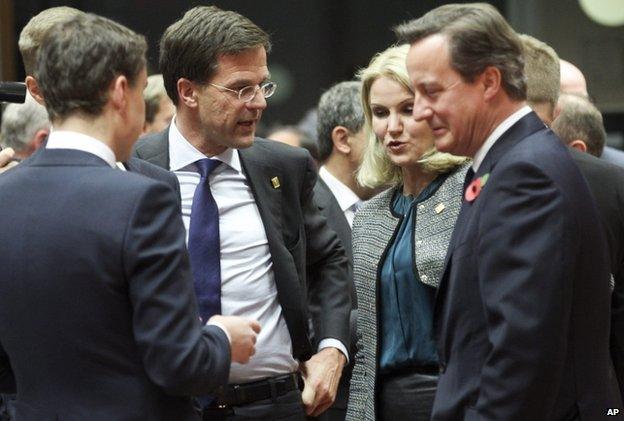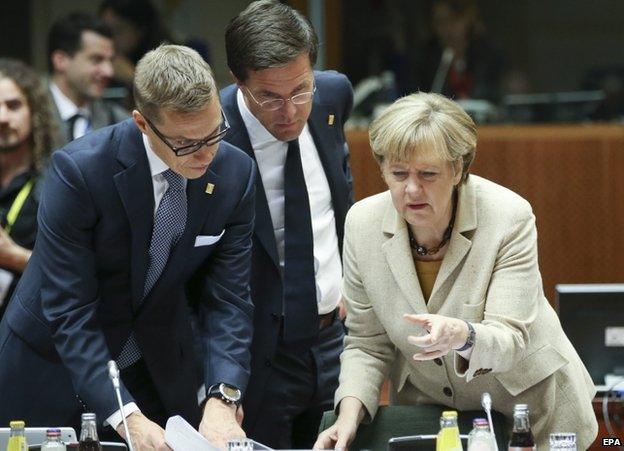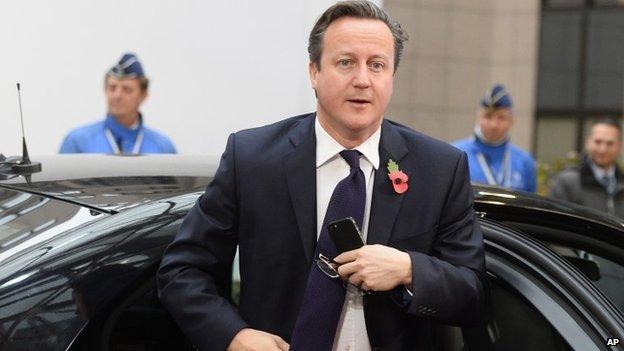UK caught up in new EU budget row
- Published
- comments

The UK is the biggest loser, while Dutch PM Mark Rutte (L facing) is also facing a large bill
About a week ago the UK learned that it would have to pay a surcharge of £1.7bn (€2.1bn) to the EU by 1 December.
It was described as a technical adjustment based on the fact that in recent years Britain's wealth has increased more than others.
The extra payment will amount to about 20% of what the UK pays annually. As one official in Brussels conceded to me: "The politics are awful."
Under rules agreed by all member states, the European Commission assesses gross national income going back over a number of years.
Since 1995 Britain's economy has performed better than other countries, particularly in the service sector. The EU Commission also now includes a figure for what it estimates to be receipts from the black economy.
While the UK faces an extra payment, France will get a rebate of around £800m. Germany also gets a reduction.
And, in one of the more curious features of this affair, both Greece and Italy - two struggling eurozone economies - will have to pay more, largely because of the size of their black economies.
Downing Street says that this is "unacceptable"; it is wrong to have fees relating to previous years being changed at a moment's notice.
Labour's Shadow Europe Minister Pat McFadden said that "it's unacceptable that the outgoing EU Commission should spring a backdated bill on member states in this way, but UK ministers have known about this since last week".
He makes the point that this proposal is from the outgoing EU Commission and that it is imperative that David Cameron urges the new Commission to look again at this proposed change.
There is, however, little that the UK can do about it. The figures are at the discretion of the European Commission.
David Cameron is looking for allies.

Germany gains more than £600m under the new calculations while Finnish PM Alex Stubb (L) also gets a rebate
He might have one in Dutch Prime Minister Mark Rutte. The Netherlands will have to find an extra 642m euros (£506m). Dutch officials are exploring legal options.
But the UK and the Netherlands may not encounter much sympathy.
One head of state said that these budget revisions happened regularly and there were winners and losers based on agreed rules.
The Prime Minister of Finland, Alex Stubb, said: "To be honest, the EU is not an accounting exercise, where you look at how much you put in and how much you get back. The UK, like Finland, is a rich country. The UK, unlike Finland, has a rebate."
The UK makes annual payments to the EU of £17bn a year.
It receives a rebate of £3.3bn. It also receives benefits like regional aid which amount to £5.2bn. It leaves the UK as a net contributor paying £8.6bn a year
The political reaction was immediate.
A senior Tory MEP said Britain was being penalised for having taken tough decisions with its economy. He thought it "outrageous".
Another British politician said that it enabled David Cameron's opponents to ridicule claims that he had reined in and helped reduce the EU budget. A UKIP official said that Britain was being made to pay for the failures of the eurozone.
And there are other pressures on budget payments. The European Parliament is demanding an increase of £5.4bn in next year's budget to help with projects to boost growth.
All of this comes at a politically sensitive moment for David Cameron.
- Published24 October 2014
- Published24 October 2014

- Published24 October 2014
